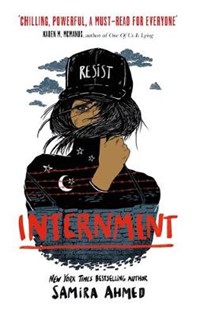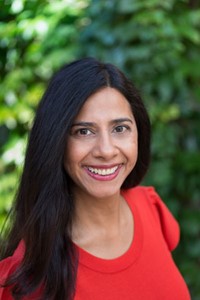Samira Ahmed


About Author
Samira Ahmed is the bestselling author of Love, Hate and Other Filters and as well as writing, has taught high school English and worked in education non-profits and on political campaigns.
Samira was born in Bombay, India, and grew up in Batavia, Illinois, in a house that smelled like fried onions, spices and potpourri. Samira once spent a year searching for the perfect mango, eventually learning that the quest was always about the journey and not merely the destination. She graduated from the University of Chicago and these days, she lives and writes in Chicago, every keystroke reminding her that art is resistance.
Find her at www.samiraahmed.com and @sam_aye_ahm
Interview
INTERNMENT
ATOM YA
MARCH 2019
INTERNMENT is a hard-hitting eye-opener of a book that develops the current rise in Islamophobia to present a world in which thousands of Muslims across the US are interned in 'resettlement camps' on the flimsiest of charges.
SAMIRA AHMED's novel raises many questions about human rights, our silent complicity as others are stripped of their rights, and the misuse of power - especially among our political leaders.
We asked SAMIRA AHMED to tell us more about INTERNMENT and her work as an author:
Q: What brought you into writing novels? Had you always wanted to be an author?
A: I was always writing as a kid, but never dreamed of being a novelist. In fact, one of my childhood ambitions was to be a poet.
In my 20s I started writing again, mostly for myself - poems, short stories. And then a story idea attached itself to my imagination and would not let go - when I started writing it as a short story, I realized that it was probably a book. And so I wrote it (over years!) and that became my first novel, Love, Hate and Other Filters.
Q: How much do you draw on your own experiences in your writing, especially in Internment through your main character, Layla Amin?
A: Like Layla, I am an Indian American Muslim. I've experienced Islamophobia at home and also abroad in Europe. So I do draw on those feelings, but Layla's life and family and story are very much her own.
I think parts of an author's life can appear on the page - often in subtle and sometimes not fully intentional ways. But I create my characters and their stories as wholly separate from my own.
Q: This novel and your first, Love, Hate and Other Filters, both tackle Islamophobia. Is this something you have faced, and has that driven you to want to write about it?
A: I've never met a single Muslim who hasn't faced Islamophobia, in one form or another. In fact, I've never met a person of color whose life experiences have been totally free of bigotry - whether that be in the form of constant micro-aggressions or more overt prejudice.
The first time I was confronted with Islamophobia was when I was seven years old and a grown man swore at me, using racist language, and then told me to go home.
I write stories that confront bigotry because no child deserves to be told they should go home, when they are home. Because no child should hear their president say that their people are "rapists" who come from "shithole countries".
I write these stories because every child deserves to see themselves as a hero on the page. I write the world as it is, so we can endeavor to create the world as it should be.
Q: How much is the currently political landscape also helping shape these novels?
A: I finished writing INTERNMENT before the US presidential elections of 2016. People often ask me if it was written as a response to this administration, but it was written because bigotry is part of our history. Because this isn't American's first experience of fascism on our own soil, perpetrated by so-called leaders.
The "logical conclusion" of bigotry has always been a part of the United States - the genocide of Native Americans, Slavery, the internment of Japanese Americans during World War 2.
The current political landscape does not exist in a vacuum but it is absolutely amplifying bigotry. The detention centers at US borders that imprison children who've been stripped from their parents - those are internment cams. We live in an age of internment. In this book, Layla fights silence complicity. So must we all.
Q: As Muslims, Layla and her family find themselves in an Internment camp, how did you develop the camp and its rules?
A: I modeled the physical camp after Manzanar, an internment camp for Japanese Americans during WW2. And many of the rules were also drawn from what prisoners during internment faced.
Q: Without giving away too much away, the teenagers in the camp become increasingly frustrated at the adults' lack of rebellion against the conditions. Do you feel a similar frustration that there hasn't been enough fight back, politically, against the current political situation?
A: I actually believe that teens and young adults have often been forced to bear the brunt of terrible decisions made by adults - they are the ones we send to fight our wars. And I believe that teens and young adults throughout history have also stood up and fought for justice - you can see it happening in the US now with the students from Parkland and St.Louis and Chicago and Flint, MI and across the nation.
Q: What would you like your readers to take from your novel, and is there anything you would like it to inspire them to do?
A: I hope readers understand that silence is complicity. And that their voices are important - and I hope they use them, in the places and ways they are able, to speak truth to power and stand up against injustice.
Q: This is your second YA novel, what was the process of writing it like for you compared with writing Love, Hate and Other Filters - especially given your earlier novel's success?
A: I took a lot longer to write the first novel! With Internment, I found myself editing a lot more as I was drafting and that resulted in stronger early drafts. Basically, I could see that I was learning to be a better writer - in terms of craft and also in terms of how I looked at my story as a whole.
Q: Where and when are your favourite times to write, and what are you writing now?
A: I write at home in my attic at my desk, or at the library. I am a very solitary writer. And right now I'm revising my third book, a literary mystery, MAD, BAD & DANGEROUS TO KNOW -coming out in Spring 2020.
Q: What are your top tips for young people inspired to write about experiences drawn from their own lives?
A: You are the only person in the world who can write the story that is in your imagination - and I hope you can believe in yourself enough to do it, even if it feels scary.
Finding your own voice is important and is not necessarily easy, it's something you develop. But the more you write, the better you become.
Writing is really about re-writing, about challenging yourself to tell the best story you can, making sure every sentence serves the story.
And I also encourage young people who want to write to read, and read widely. Excellent readers make excellent writers.
Q: What is your favourite escape from writing?
A: Sometimes writers can feel a little burn out from writing, but I still always am drawn to stories - so I love to read when I'm not writing, especially out of my genre, or binge something on television. Often while eating chocolate.
 Internment
Internment
 Love, Hate & Other Filters
Love, Hate & Other Filters
